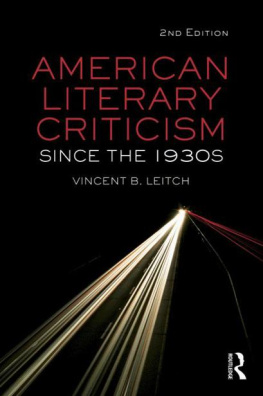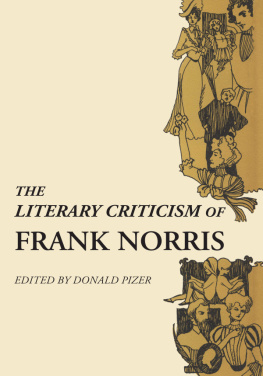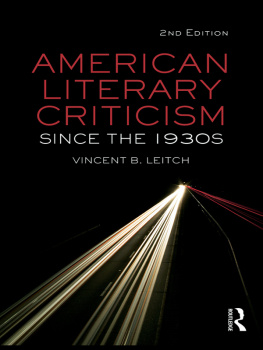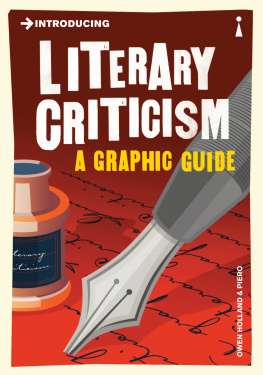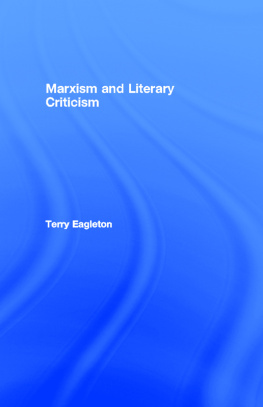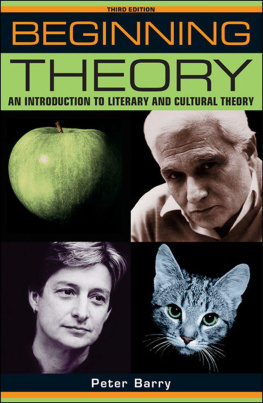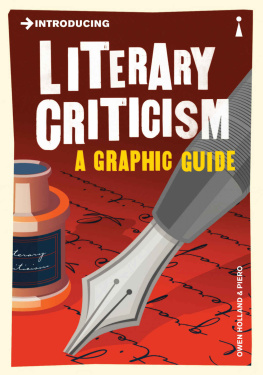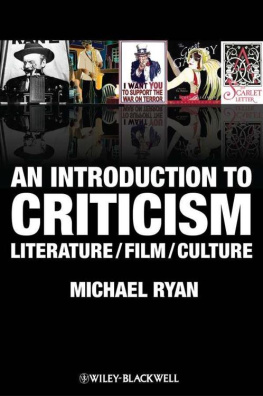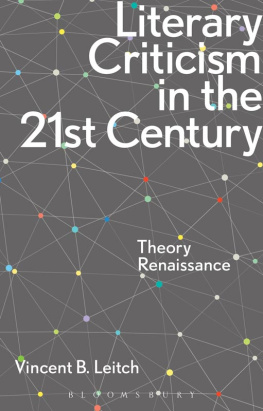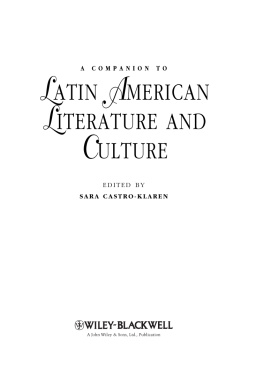
American Literary Criticism since the 1930s
American Literary Criticism since the 1930s fully updates Vincent B. Leitchs classic book, American Literary Criticism from the 30s to the 80s following the development of the American academy right up to the present day.
Updated throughout and with a brand new chapter, this second edition:
provides a critical history of American literary theory and practice, discussing the impact of major schools and movements;
examines the social and cultural background to literary research, considering the role of key theories and practices;
provides profiles of major figures and influential texts, outlining the connections among theorists;
presents a new chapter on developments since the 1980s, including discussions of feminist, queer, postcolonial and ethnic criticism.
Comprehensive and engaging, this book offers a crucial overview of the development of literary studies in American universities, and a springboard to further research for all those interested in the development and study of literature.
Vincent B. Leitch is George Lynn Cross Research Professor and holds the Paul and Carol Daube Sutton Chair in English at the University of Oklahoma. He is author of Deconstructive Criticism (1983), Cultural Criticism, Literary Theory, Poststructuralism (1992), PostmodernismLocal Effects, Global Flows (1996), Theory Matters (2003), Living with Theory (2008) and editor of the Norton Anthology of Theory and Criticism, 2nd Edition (2010).
Praise for the First Edition
It would be difficult to imagine a more useful guide to the contemporary critical scene than this volume Both a history of critical ideas and an analysis of the modes of critical production, American Literary Criticism should take its place for quite some time as the definitive work in its field.
American Literature
Leitchs book is an achievement of genuine merit and will contribute much to the self-understanding of the American critical institutions.
Modern Language Notes
Joining in the widespread current efforts to place literature and literary studies back within history, Vincent Leitch presents the first panoramic and all-inclusive narrative of the history of American literary criticism from the 1930s to the present. Leitchs authoritative and even-handed account is placed against the backdrop of the social, cultural and political history of the period.
J. Hillis Miller, University of California, Irvine
Vincent Leitch has managed to get the last fifty years of American Literary criticism into a readable narrative that does not unduly reduce the complexity, complication and plain messiness of the story. In all this Leitch does an excellent job of embedding the history of criticism in economic, social, political, cultural and institutional history.
Gerald Graff, Northwestern University
At once a readable and reliable guide to literary criticism and theory, one that should be extremely helpful both to students and teachers of the subject.
Stanley Fish, Duke University
Leitchs [book] really is an excellent advanced introduction to the history of literary theory in America, written in a lively style accessible even to the novice. This is a book worth recommending to students who are coming to literary theory for the first time as well as those who are interested in the historical, economic, cultural, social, intellectual and importantly, institutional contexts of contemporary theoretical debates and critical developments. The book is very user-friendly, having a full index and a good set of references.
Deborah L. Madsen, Journal of American Studies
American Literary Criticism since the 1930s
Second edition
Vincent B. Leitch
LONDON AND NEW YORK
First edition published 1988 by Columbia University Press
Second edition published 2010 by Routledge
2 Park Square, Milton Park, Abingdon, OX14 4RN
Simultaneously published in the USA and Canada
by Routledge
270 Madison Ave, New York, NY 10016
Routledge is an imprint of the Taylor & Francis Group, an informa business
This edition published in the Taylor & Francis e-Library, 2009.
To purchase your own copy of this or any of Taylor & Francis or Routledges collection of thousands of eBooks please go to www.eBookstore.tandf.co.uk.
1988, 2010 Vincent B. Leitch
All rights reserved. No part of this book may be reprinted or reproduced or
utilised in any form or by any electronic, mechanical, or other means, now
known or hereafter invented, including photocopying and recording, or in
any information storage or retrieval system, without permission in writing
from the publishers.
British Library Cataloguing in Publication Data
A catalogue record for this book is available from the British Library
Library of Congress Cataloging in Publication Data
Leitch, Vincent B., 1944
American literary criticism since the 1930s / Vincent B. Leitch. 2nd ed.
p. cm.
Updated ed. of: American literary criticism from the thirties to the eighties.
1988.
Includes bibliographical references and index.
1. Criticism United States History 20th century. 2. American
literature History and criticism Theory, etc. I. Leitch, Vincent B., 1944
American literary criticism from the thirties to the eighties. II. Title.
PS78.L4 2009
801.950973 dc22
2009004863
ISBN 0-203-87305-X Master e-book ISBN
ISBN10:0-415-77817-4 (hbk)
ISBN 10:0-415-77818-2 (pbk)
ISBN 10:0-203-87305-X (ebk)
ISBN 13:978-0-415-77817-6 (hbk)
ISBN 13:978-0-415-77818-3 (pbk)
ISBN 13:978-0-203-87305-2 (ebk)
Copyright 2008/2009 Mobipocket.com. All rights reserved.
Reader's Guide
This ebook has been optimized for MobiPocket PDA.
Tables may have been presented to accommodate this Device's Limitations.
Table content may have been removed due to this Device's Limitations.
Image presentation is limited by this Device's Screen resolution.
All possible language characters have been included within the Font handling ability of this Device.
Contents
Preface
In the 1880s departments of literary study first began to appear in leading American universities. Within a generation multifaceted struggles were underway between advocates of an elitist, literary aesthetic and adherents of a somewhat populist viewpoint emphasizing the sociological foundations of poetic art. In the 1930s the antagonistic dialogue between conservative New Critics and Marxist literary theorists constituted an especially strong form of this struggle, which manifested itself in other vigorous forms up to the present, as, for example, in the lingering conflict today between second-generation Yale School deconstructors and leftist proponents of cultural studies. U.S. literary criticism since the 1930s has exhibited continuous struggles between various formalistic schools of criticism devoted to linguistic, rhetorical, and epistemological habits of mind and certain cultural movements committed to sociological, psychological, and political modes of thinking. At their worst these two contending wings of academic literary criticism foster characteristic disorders of reading: one discounts the reader and aggrandizes the text whereas the other empowers the reader and dominates the text. One conceives the literary work as a miraculous, semi-autonomous aesthetic artifact and the other conceptualizes literature as a symptomatic cultural production grounded in anthropological, economic, social, and political history. Characteristically, one veers toward liberal and conservative political views and the other toward left-liberal and leftist perspectives. In the final analysis, however, this large-scale dialectic and allegorical division tells us remarkably little about the detailed microhistories composing American literary criticism since the 1930s.
Next page
